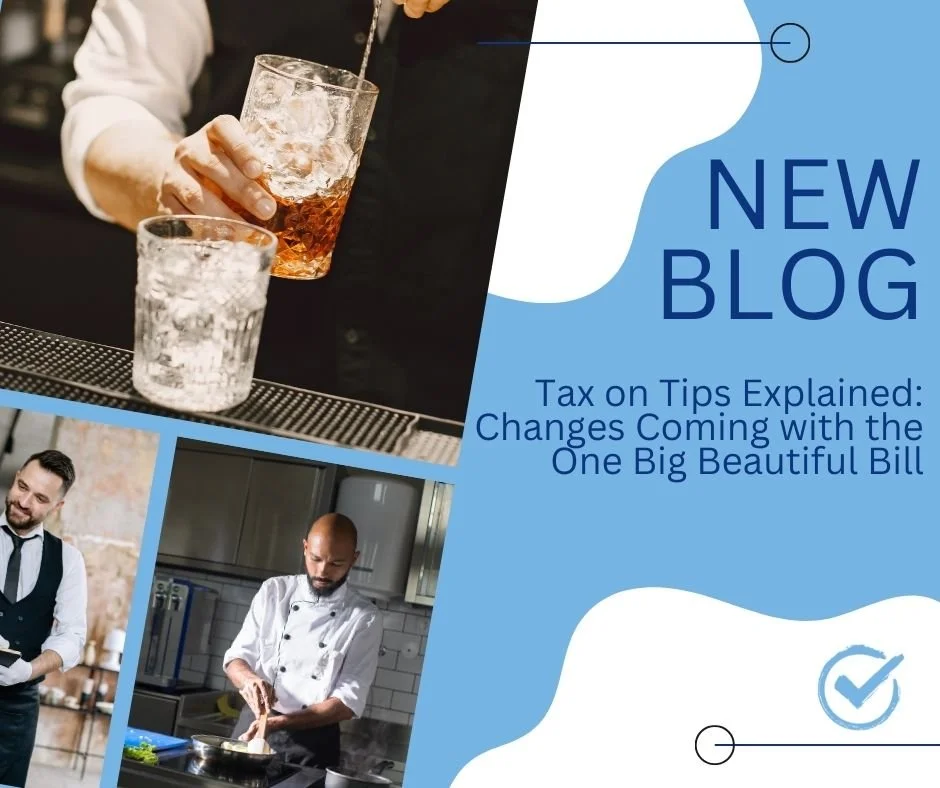Tax on Tips Explained: Changes Coming with the One Big Beautiful Bill
If you’ve ever worked in a restaurant, behind a bar, at a salon, or even delivering food, you know how much your livelihood depends on tips. For many New Hampshire families and small business employees, tips aren’t just extra pocket change—they’re the difference between making ends meet and falling short. That’s why the recent headlines about “no tax on tips” caught so much attention. But here’s the truth: the new rules under the One Big Beautiful Bill don’t erase taxes on tips entirely. Instead, they introduce a federal income tax deduction of up to $25,000 for tip income.
Confused? You’re not alone. The wording has caused a lot of head-scratching. But don’t worry—we’re here to break it down in plain English so you can understand exactly what’s changing, what it means for you, and how to make the most of this new law.
What’s Actually Changing
Let’s cut through the noise. Starting in 2025, workers who earn tips will have access to a brand-new deduction designed to lighten the load at tax time.
Here’s what you need to know:
Deduction up to $25,000: Workers can deduct up to $25,000 of qualified tip income from their federal taxable income.
Income limits apply: The deduction phases out for individuals earning above $150,000 and joint filers earning above $300,000.
Temporary relief: This deduction is only available for tax years 2025 through 2028—so it’s a short-term benefit unless Congress extends it.
Tips still count as income: You must still report all tips—both cash and digital—as income. Payroll taxes like Social Security and Medicare will still apply. State tax rules may also vary, so don’t ignore those.
IRS enforcement is increasing: The IRS plans to crack down on industries where tip income is common. Expect more reporting requirements, more audits, and fewer chances to “forget” about those cash tips.
So why this change? Lawmakers framed it as an attempt to bring fairness and accuracy to tip-heavy industries. Many workers have long felt overtaxed, while underreporting and compliance gaps have frustrated business owners. This new deduction aims to give workers relief while ensuring the IRS gets a clearer, more accurate picture of tip income.
Why This Matters for You
The new tax on tip deduction affects both employees and small business owners—but in very different ways.
For Workers
If you’re a bartender, server, barista, stylist, valet, or anyone else living off tips, here’s what this means for you:
Report every dollar: All tips—cash, Venmo, or credit card—must be logged and reported. If you don’t, you could lose access to the deduction altogether.
Lower taxable income: That $25,000 deduction could seriously shrink your taxable income. For example, if you made $40,000 in wages and tips last year, this deduction could reduce your taxable income to $15,000. That’s a huge difference come refund time.
Avoid penalties: Failing to report properly doesn’t just mean missing out on savings—it could also bring IRS penalties, interest, or even trigger an audit.
For Small Business Owners
If you own a restaurant, salon, or other service-based business, you’ve got a whole new set of responsibilities.
Payroll compliance is key: Your payroll systems must correctly handle the new deduction and track tip reporting.
Risk of fines: The IRS isn’t just targeting workers—they’re also looking at employers. Failing to update your processes could result in steep fines or audits.
Protecting your team: Transparent reporting safeguards your employees’ ability to claim their deduction and protects your business reputation.
Bottom Line
The bill offers real relief, but only if reporting is done properly. Think of it as a two-part deal: you still have to play by the rules, but you get rewarded for doing so.
What You Can Do Right Now
If you want to benefit from the new rules and avoid headaches later, there are a few practical steps you can take today.
1. Track Every Tip
Get in the habit of recording tips daily. Don’t rely on your memory—keep a small notebook, use your phone’s notes app, or better yet, use a dedicated tip-tracking app. Many payroll systems now allow employees to enter tips digitally, which syncs automatically with employer records.
2. Talk with Your Employer or Payroll Provider
Business owners and workers alike should check in with payroll providers to confirm that systems are updated for the new law. Don’t assume—ask questions and get clear answers.
3. Work with a Tax Professional
Here’s the big one: the new rules can get messy, especially when you throw in state tax laws, payroll taxes, and reporting requirements. A qualified tax professional (hi, that’s us 👋) can make sure your tips are reported correctly, your deduction is maximized, and you’re not leaving money on the table—or accidentally putting yourself at risk.
4. Use Technology to Your Advantage
Payroll platforms like Gusto, QuickBooks, or ADP will likely roll out updates to account for the new deduction. If you’re a business owner, make sure you enable these features. If you’re an employee, check your pay stubs to ensure your tips and deductions are being handled accurately.
Clearing Up the Confusion
The phrase “no tax on tips” might sound like a dream come true—but it’s a bit misleading. Tips are still income. They’re still subject to payroll taxes. You still need to report them in full.
What’s new—and exciting—is that now there’s a valuable deduction that can bring much-needed relief to the people who depend on tip income. Think of it as a middle ground: you’re not off the hook entirely, but you’re getting a break that could make a big difference when you file your taxes.
Taking the Stress Out of Taxes on Tips
We know tax rules can feel overwhelming, especially when the news headlines don’t tell the whole story. But here’s the good news: you don’t have to figure this out alone.
Ready to ditch tax stress? Join our bi-weekly Open Mic Tax Forums [Insert link to register]—or reach out today for your free, zero-pressure consultation. We’ll take it from there. 🔗 accountabilitytab.com/contact
Tips might come in singles, but your peace of mind should come in big bills. Let’s make sure you get every dollar of relief you deserve.

